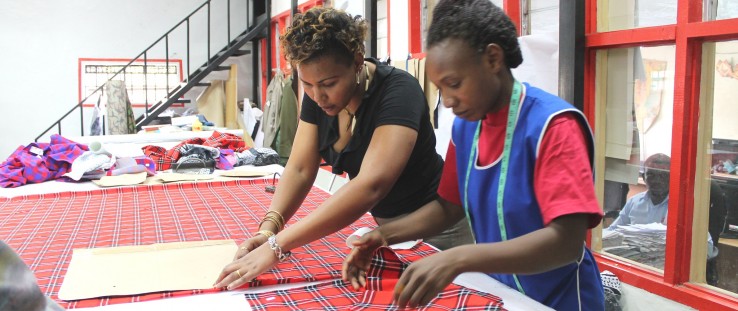 Masai fabrics are hand cut in preparation for custom-made Doreen Mashika handbags.
Rudy Gharib, USAID
Masai fabrics are hand cut in preparation for custom-made Doreen Mashika handbags.
Rudy Gharib, USAID
 Masai fabrics are hand cut in preparation for custom-made Doreen Mashika handbags.
Rudy Gharib, USAID
Masai fabrics are hand cut in preparation for custom-made Doreen Mashika handbags.
Rudy Gharib, USAID
In late February, U.S.-based retailer Anthropologie launched the “Legend and Song Collection” celebrating the craft and artisans of East Africa. The new collection brought together traditional African bold prints, textures and beading with Anthropologie’s modern, free-style fashion. Manufactured entirely in East Africa—Ethiopia, Tanzania and Rwanda—with support from USAID’s East Africa Trade Hub, Legend and Song is a prime example of President Barack Obama’s Trade Africa Initiative to boost trade with and within Africa.
USAID’s Trade Hubs—there are two more covering West and Southern Africa—have worked with African governments, regional economic communities and the private sector for the past 10 years to boost Africa’s exports to world markets, and specifically the United States, under a unique trade preference program: the African Growth and Opportunity Act (AGOA). AGOA was enacted by Congress in 2000 to expand exports from sub-Saharan Africa, and improve economic relations between the United States and the region. It has expanded market access for textiles and apparel into the United States for eligible countries, resulting in rapid industry growth and the creation of hundreds of thousands of jobs.
The Trade Hubs identify concrete business opportunities for African firms and associations that align with supplier strategies of regional and international importers. Using this market intelligence, the Trade Hubs provide assistance to firms and associations to meet the stringent quality, dependability, volume, traceability and speed of delivery requirements of the international market; help African firms “meet the market” through participation in international trade shows and business-to-business matchmaking; and advocate for business and trade-friendly policies.
For example, the Trade Hubs have linked large apparel manufacturers to international brands to export mass-produced t-shirts and jeans, including Philips Van Heusen, and linked to small fashion design houses that combine colorful, traditional techniques with a modern eye to create boldly printed outfits, beaded and horn jewelry, and textured handbags that value the story of Africa.
Since 2009, USAID’s East Africa Trade Hub has facilitated over $200 million in exports to the United States under AGOA. For Ethiopia alone, the Trade Hub supported over 31 percent of the country’s $35.5 million in AGOA exports.
“AGOA is a successful strategy to promote global trade competitiveness, job growth and poverty reduction,” said Chief of Party Kathleen Montgomery. “Expanded trade with these countries creates jobs not only in Africa, but also in the U.S. According to the African Coalition on Trade, AGOA-related investments resulted in the creation of 300,000 jobs in sub-Saharan Africa and nearly 120,000 jobs in the U.S.”
Investment in “fiber to fabric” production—where African cotton is woven into African textiles, which are then used to produce apparel in Africa—is important for export diversification and income generation. Exports from Africa have traditionally been unprocessed, raw material, with little value or employment created.
“Instead of relying on exports of raw materials, the continent should add value to its commodities to promote sustained growth, jobs and economic transformation,” according to the 2013 U.N. Economic Commission for Africa report “Making the Most of Africa’s Commodities.”
USAID’s East Africa Trade Hub set out to link the African artisans it has been supporting with market demand for their products. Meeting with key decision makers at Anthropologie to understand its sourcing requirements in early 2013, the Trade Hub used this market information to link East African companies to Anthropologie’s design aesthetic and purchasing requirements. The Trade Hub set up buyers’ visits across East Africa to introduce Anthropologie executives to Sammy Handmade of Ethiopia; Mille Collines, Gahaya Links and Indego Africa of Rwanda; and Doreen Mashika, Zanzibar and URU Diamonds of Tanzania.
Sammy Handmade, launched by entrepreneur Sammy Abdella in Addis Ababa in 2008, is a luxury brand of handwoven textiles and finished leather goods from Ethiopia that infuses Ethiopian traditions with modern influences. Abdella has a strong social focus, employing marginalized groups through production and export of his products. He ensures workers receive a fair wage, provides safe working conditions, and supports their advancement with technical, business and management training. Since working with the Trade Hub, which included support to upgrade the brand’s production line, and business-to-business matchmaking at international trade shows, Sammy Handmade has grown from three to 43 permanent employees, and engages over 400 weavers, embroiders and leather producers. Scarves and handbags, with an average price tag of $140 and $275, respectively, from Sammy Handmade have been sold in Anthropologie, Barney’s New York and Eileen Fisher, as well as museum shops in New York, Paris and San Francisco.
Doreen Mashika, a Tanzanian entrepreneur, launched a line of fashion goods and accessories in Zanzibar by partnering with women’s groups in local villages who make their products largely by hand, applying traditional African techniques.
“I visit the villages so I can meet my crafters and purposely build a relationship that cultivates high levels of mutual appreciation, respect and trust,” said Mashika.
She credits the Trade Hub with providing the guidance and exposure to U.S. and international markets she needed to build and expand her products for export, including the Legend and Song order from Anthropologie. And her products have made it into the highest echelons of U.S. political power: U.S. first lady Michelle Obama not only owns one of her handbags, but wrote her a personal letter expressing her support for her brand—which fuses western and African design products for a global audience—and her social initiative.
By focusing on not only the mass apparel markets that drive employment generation, but niche markets that showcase the story of Africa, “our goal is to change the perception of doing business in Africa and help foster business ties to global markets, especially the U.S. It is truly gratifying to see the resulting increase in trade in the region,” said Finn Holm-Olsen, the East Africa Trade Hub’s AGOA adviser. “In addition to Anthropologie, companies like Eileen Fisher, Kate Spade and EDUN are also increasing their efforts to source from East Africa.”
Anthropologie is also reaping benefits of deals it has made with the African entrepreneurs. “With the Trade Hub’s guidance, we were able to seamlessly access the market in this region. It is exciting for us as a company and we look forward to the future possibilities,” said Karen Wilkins, director of technical design for Urban Inc., which owns the Anthropologie brand. Wilkins and her team of design specialists worked closely with the companies to make sure the specifications and designs were technically accurate.
Anthropologie’s adoption of a brand to promote goods from East Africa is also an indication of the rising prominence of designers and manufacturers in the region and their ability to find success in the U.S. market and markets worldwide.
“When President Obama launched the Trade Africa Initiative in July 2013, he announced ambitious goals to boost intra-regional and export trade in sub-Saharan Africa, starting with East Africa,” said Power Africa and Trade Africa Coordinator Andrew Herscowitz. “AGOA is a cornerstone of the U.S.-Africa trade relationship, but tariff preferences alone are not sufficient. Trade Africa, through projects like the Trade Hub, assists beneficiary countries to fully utilize AGOA to promote transformational growth in trade and investment.”







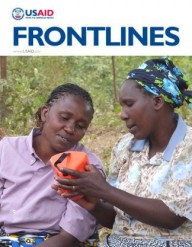

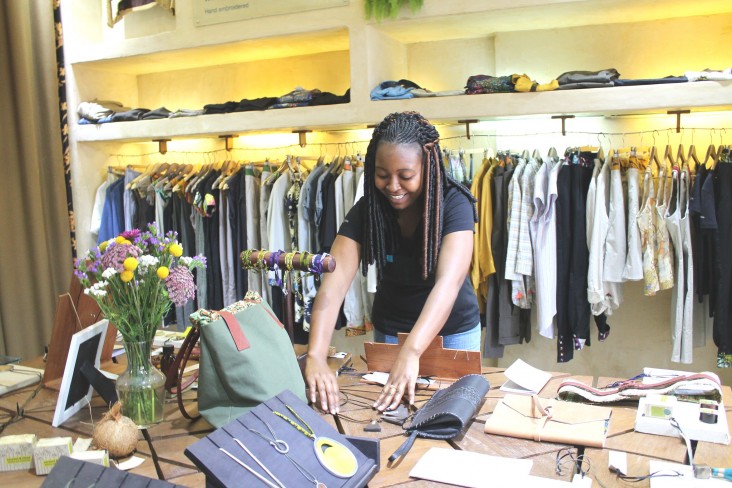
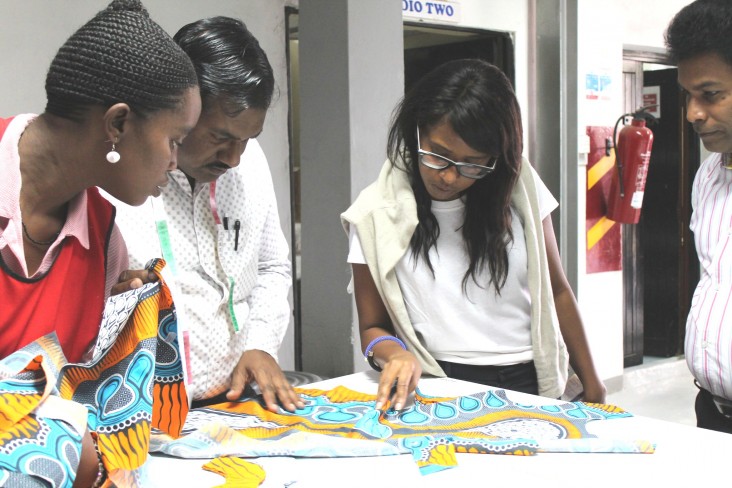
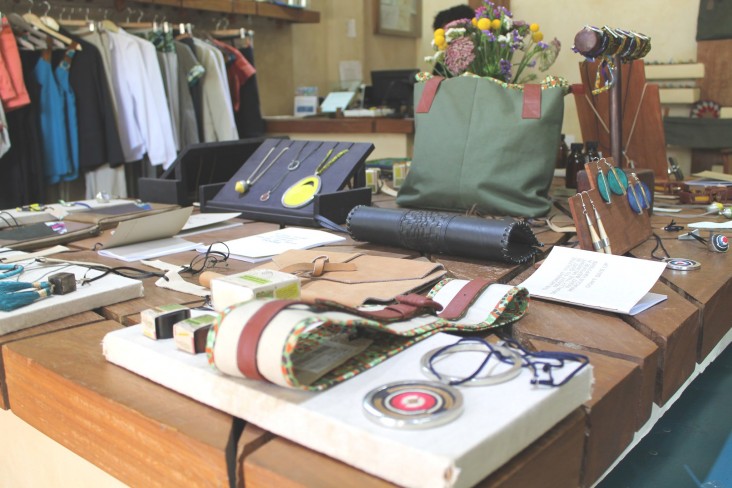

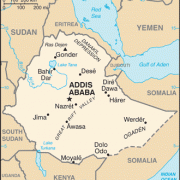
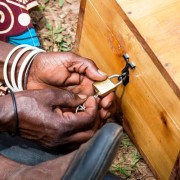
Comment
Make a general inquiry or suggest an improvement.